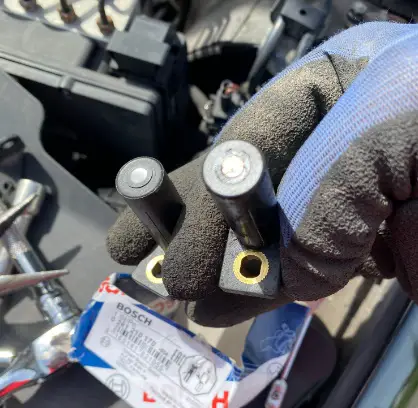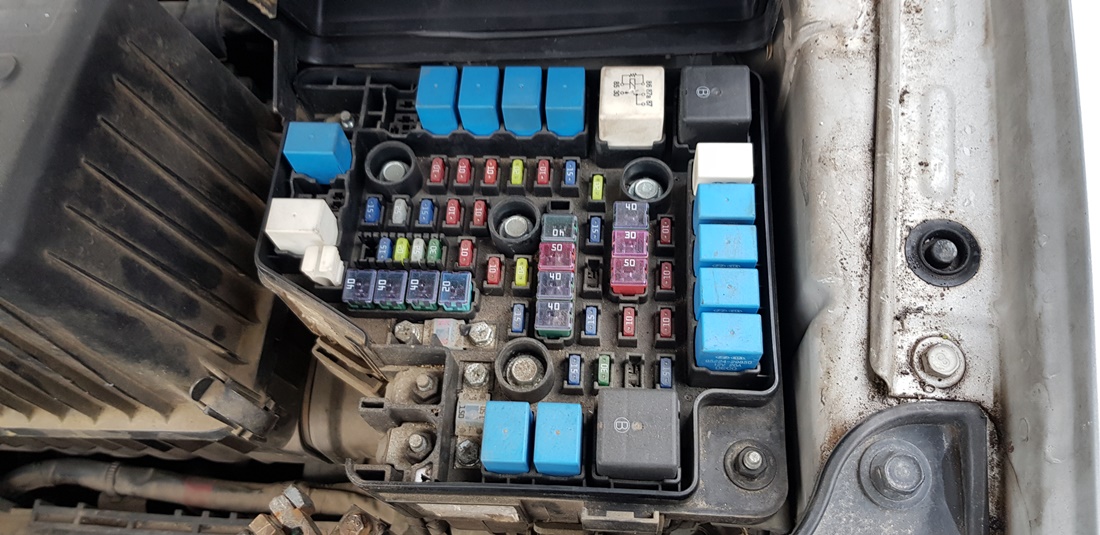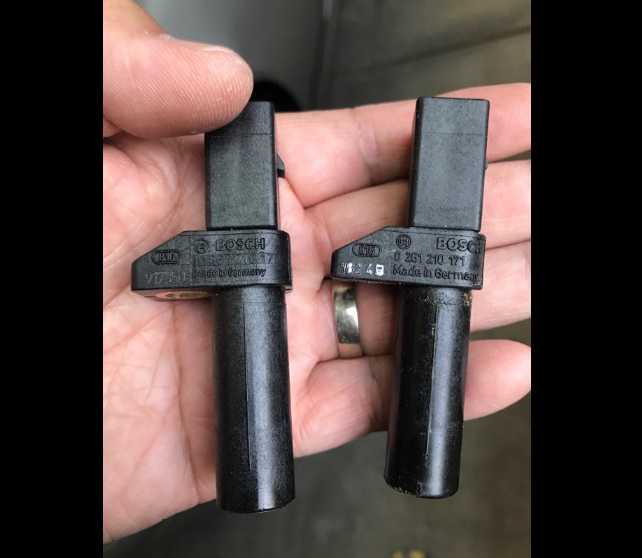When your car starts developing a problem, often the first sign is going to be an unfamiliar sound that you hear when you’re driving. This is the way your car will communicate with you and indicate that something is wrong.
To avoid major repair bills, it’s best if you know what each sound means so you can get the problem fixed. Now, if you are not a mechanic, all of the sounds might sound the same. But, almost all parts of the vehicle make a different sound when they are about to fail.
So, if you are driving down the road and you hear grinding, clunking, squalling, clicking, groaning, and rattling sounds coming from your car, you better know what is going on.
- Key Takeaway
- 8 Common Noises Your Car Makes and How To Fix Them
- 1. Screeching or grinding sound coming from your wheels
- 2. Chirping or a squealing sound coming from your engine compartment
- 3. Groaning or whining noise when turning the steering wheel
- 4. Groaning or a rumbling sound when driving on the highway
- 5. Clicking sound coming from underneath the car when turning left or right
- 6. Clucking sounds when driving over rough roads or over bumps
- 7. Buzzing or rattling sound at certain speeds or RPMs
- 8. Car running loud sounding like a hot-rod
- FAQs
- Q: What does it mean when my car makes a rattling noise?
- Q: Why is my car making a noise when I accelerate?
- Q: What should I do if my car is making a squealing noise when I brake?
- Q: What could be causing a grinding noise in my car?
- Q: Why is my car making a whining noise?
- Q: What does it mean when my car makes a clunking noise?
- Q: Why is my car making a clicking noise?
- Q: How do I diagnose the problem when my car is making a noise?
- Q: What should I do if my car is making a noise that I should never ignore?
- In Conclusion
Key Takeaway
- While some car noises can be harmless, others can indicate serious mechanical issues, so it’s generally not recommended to continue driving a car that’s making unusual noises without having it checked by a professional.
8 Common Noises Your Car Makes and How To Fix Them
- Screeching or grinding sounds coming from your wheels can be fixed by replacing the brake rotors.
- Chirping or a squealing sound coming from your engine compartment can be fixed by replacing the serpentine belt.
- Groaning or whining noise when turning the steering wheel can be fixed by adding more power steering fluid.
- Groaning or a rumbling sound when driving on the highway could be a sign of a failing transmission.
- Clicking sounds coming from underneath the car when turning left or right can be fixed by replacing the CV axle.
- Clucking sounds when driving over rough roads or over bumps can be fixed by replacing the stabilizer links.
- Buzzing or rattling sound at certain speeds or RPMs is usually caused by a damaged exhaust shield.
- Car running loud sounding like a hotrod is probably an exhaust leak.
1. Screeching or grinding sound coming from your wheels

If you hear screeching or grinding sounds coming from your wheels, it is most likely that your brake pads are worn out and there is metal-to-metal contact. Most brake pads are designed with a little indicator built into them that squeaks when your pads are getting low and need to be replaced.
If the brake pad material completely wears away, the metal backing will rub on your brake rotors and make a really bad grinding noise.
How to fix the screeching or grinding sound coming from your wheels
- Identify the Source of the Noise: First, try to identify where the noise is coming from. It could be from the front or back wheels. This will help you narrow down the potential problems.
- Check the Brake Pads: Often, a screeching or grinding noise is due to worn-out brake pads. If the brake pads are worn down to their metal backing plates, they will make a grinding noise as they contact the rotors. Inspect your brake pads and if they’re worn out, replace them immediately.
- Inspect the Rotors: If your brake pads are in good condition but you’re still hearing a grinding noise, it’s time to check the rotors. If they are warped or have deep grooves, they may need to be replaced or resurfaced.
- Check for Foreign Objects: Sometimes, a small rock or other debris can get caught between the rotor and the brake pad, causing a grinding noise. Inspect your brakes for any foreign objects and remove them if found.
- Inspect the Wheel Bearings: If the noise persists even after checking the brakes, it could be a problem with your wheel bearings. If they’re damaged or worn out, they can cause a grinding noise. You’ll likely need to take your car to a mechanic to have these replaced.
- Take Your Car to a Mechanic: If you’ve checked everything and still can’t figure out the source of the noise, it’s time to take your car to a mechanic. They have the tools and expertise to diagnose and fix the problem.
2. Chirping or a squealing sound coming from your engine compartment

If you hear a constant chirping or squalling noise or just when you start the car up first thing in the morning, most likely you have a loose or worn-out belt.
A lot of the things in your engine such as the alternator, power steering pump, compressor, and more are driven by belts. All of these components are driven by one belt called a serpentine belt. Sometimes, the individual components like the alternator will have their own belt.
When that belt gets old, screeched, cracked, or oily, they start slipping and that’s where you’re gonna get that squeaking or chirping noise.
How to fix a chirping or squealing sound coming from your engine compartment
- Identify the Sound: First, you need to identify the exact source of the sound. Open your hood while the engine is running (be careful) and try to locate where the noise is coming from.
- Check the Belts: Often, a chirping or squealing sound is due to a problem with the belts. Inspect your serpentine and timing belts for any signs of wear, fraying, or looseness.
- Tighten or Replace the Belts: If the belts are loose, tightening them might solve the problem. If they’re worn or frayed, they’ll likely need to be replaced.
- Check the Pulleys: The pulleys that the belts run on could also be causing the noise. If they’re misaligned or worn out, they can cause the belts to squeal. Check for signs of wear or damage and replace if necessary.
- Inspect the Alternator: If the belts and pulleys seem fine, the problem could be with your alternator. A failing alternator can sometimes cause a squealing noise. You’ll likely need a mechanic to inspect and replace this if it’s the cause.
- Look at the Power Steering Pump: A failing power steering pump can also cause a chirping or squealing noise. Check your power steering fluid level and refill if it’s low. If the pump is failing, it will likely need to be replaced by a mechanic.
- Consult a Mechanic: If you’ve checked all these things and still haven’t found the source of the noise, it’s time to consult a professional. Take your car to a mechanic for a thorough inspection and diagnosis. They have the expertise and tools to find and fix the problem says The Personal.
3. Groaning or whining noise when turning the steering wheel

If you hear a groaning or a whining noise coming from under the hood when turning the steering wheel could be due to low power steering fluid or an air leak somewhere in the power steering system.
In order to verify that you are having issues with the power steering system is to check it. Open the hood and look for the power steering fluid reservoir. Some of the reservoirs will have a level written on the side and some will have a dipstick. Anyhow, check the level of the power steering fluid and add more if needed.
Another problem that can cause the groaning or whining noise even though the fluid level is fine, is air getting in the power steering system. While the car is running, a lot of bubbles will be produced inside the reservoir.
How to fix the groaning or whining noise when turning the steering wheel
- Identify the Noise: First, ensure the noise is indeed coming from the steering system. The sound should increase in pitch or volume when you turn the steering wheel.
- Check Power Steering Fluid: Low power steering fluid is often the cause of such noises. Locate the power steering fluid reservoir under the hood (refer to your vehicle’s manual if needed), and check the fluid level. If it’s low, refill it to the specified level with the correct type of fluid for your vehicle.
- Inspect for Leaks: If the fluid was low, check for leaks in the system. This could be in the reservoir itself, the hoses, or the power steering pump. If you find a leak, it will need to be repaired.
- Check the Power Steering Pump: A failing power steering pump can also cause a whining or groaning noise. Look for signs of wear or damage. If the pump is failing, it will likely need to be replaced.
- Examine the Belts: The drive belt that powers the power steering pump may be worn or loose, causing the noise. Inspect the belt for signs of wear or looseness and replace or tighten as necessary.
- Inspect the Steering Rack: If the noise persists, the problem might be in the steering rack or gearbox. These are more complex parts of the system and will likely require a professional mechanic to diagnose and repair.
4. Groaning or a rumbling sound when driving on the highway

If you hear a groaning or a rumbling sound when driving on the highway fast and the noise gets louder the faster you go, the issue could be worn wheel bearings or worn-out tires.
This high-speed rumbling sound with the tires and the bearings is probably one of the hardest to diagnose. A couple of little tricks that can help you diagnose the problem are getting your car on a nice highway and start accelerating.
Then, shift to neutral and see if the sound goes away. If it goes away, then you might have an issue with the transmission.
How to fix the groaning or rumbling sound when driving on the highway
- Identify the Noise: Note when the noise occurs. Is it constant? Does it increase with speed? This could help identify whether it’s an issue with the tires, drivetrain, or engine.
- Check Your Tires: Worn or improperly inflated tires can cause a rumbling noise. Check the tire pressure and inspect them for signs of uneven wear or damage. If needed, inflate them to the correct pressure or replace them.
- Inspect the Wheel Bearings: Damaged wheel bearings can cause a groaning or rumbling sound. You may need to lift the car safely or have a professional mechanic check this for you.
- Examine the Drivetrain: Problems with the drivetrain, such as a worn universal joint or differential, can cause noises at highway speeds. These will likely require a professional mechanic for repair.
- Check the Engine and Transmission Mounts: Worn or broken mounts can cause the engine or transmission to vibrate, causing a rumbling noise. Replacement is usually necessary in this case.
- Inspect the Exhaust System: An exhaust leak or a loose exhaust component can also cause a rumbling noise. Check for any signs of damage or loose parts1.
5. Clicking sound coming from underneath the car when turning left or right

If you hear a clicking sound coming from underneath the front side of the car when you are making a hard left or right turn it is your CV axle going bad.
You may also experience shaking or vibration in the steering wheel as you are accelerating and the vibration stops as soon as you let off the accelerator. A CV shaft is a steel shaft that connects your gearbox and your wheels. It has a joint on each end covered in a rubber boot.
Most of the vehicles will have a CV axle on each side on the front. Some cars even have a CV axle in the back.
How to fix the clicking sound coming from underneath the car when turning left or right
- Identify the Noise: Ensure the noise is indeed coming from underneath the vehicle and is associated with turning. This will help narrow down the possible causes.
- Check the CV Joints: The most common cause of a clicking noise when turning is a faulty CV (constant velocity) joint. Look for signs of wear or damage, such as torn boots or leaked grease. If the CV joint is damaged, it will need to be replaced.
- Inspect the Wheel Bearings: Although less common, a worn wheel bearing can sometimes cause a clicking sound when turning. You may need to lift the car safely or have a professional mechanic check this for you.
- Examine the Power Steering System: If your car makes a clicking noise when you’re turning, it could be related to the power steering system. Check the power steering fluid level and refill it if it’s low.
- Check the Suspension: Worn or loose suspension components can also cause a clicking noise. Inspect the suspension for any signs of wear or looseness and replace or tighten as necessary.
- Check for Loose Wheel Lug Nuts: Loose lug nuts can also cause a clicking noise, especially when turning. Ensure all lug nuts are properly tightened.
6. Clucking sounds when driving over rough roads or over bumps

If you hear clucking sounds when driving over rough roads or over bumps, it could be due to suspension parts going bad, but usually, it’s just the stabilizer links going bad.
In my experience, the stabilizer links are one of the most common culprits for suspension noise. They’re really easy to diagnose and cheap to fix. On most vehicles, you will be able to inspect the stabilizer links without removing the wheel.
How to fix the clucking sounds when driving over rough roads or over bumps
- Check the CV Joints: The most common cause of a clicking noise when turning is a faulty CV (constant velocity) joint. Look for signs of wear or damage, such as torn boots or leaked grease. If the CV joint is damaged, it will need to be replaced.
- Inspect the Wheel Bearings: Although less common, a worn wheel bearing can sometimes cause a clicking sound when turning. You may need to lift the car safely or have a professional mechanic check this for you.
- Examine the Power Steering System: If your car makes a clicking noise when you’re turning, it could be related to the power steering system. Check the power steering fluid level and refill it if it’s low.
- Check the Suspension: Worn or loose suspension components can also cause a clicking noise. Inspect the suspension for any signs of wear or looseness and replace or tighten as necessary.
- Check for Loose Wheel Lug Nuts: Loose lug nuts can also cause a clicking noise, especially when turning. Ensure all lug nuts are properly tightened.
7. Buzzing or rattling sound at certain speeds or RPMs

If you hear a buzzing or rattling sound at certain speeds or RPMs, the issue causing that sound is a damaged exhaust shield. Different elements of the exhaust system such as the exhaust manifold, catalytic converter, and muffler are protected by thin metal shields.
These exhaust shields can easily be damaged by rocks, rust, or bent from bad parking. When an exhaust shield is damaged, they start to make really loud buzzing noises at certain speeds or RPMs. For example, when you get your engine to 1500 RPMs, you could hear a buzzing noise underneath your console or under the hood.
How to fix the buzzing or rattling sound at certain speeds or RPMs
- Inspect the Exhaust System: A loose or damaged exhaust system can cause a buzzing or rattling sound. Check for any signs of damage, rust, or loose mounts. If necessary, replace or tighten the affected parts.
- Check the Heat Shields: Heat shields are metal plates that protect parts of your car from the heat of the exhaust. They can become loose over time and cause a buzzing or rattling sound. Inspect them for looseness or damage and secure or replace them if necessary.
- Examine the Engine: Sometimes, an engine can make a buzzing sound due to issues like a worn serpentine belt, a failing timing chain, or a problem with the throttle. These issues may require professional attention.
- Inspect the Transmission: A worn transmission or a low level of transmission fluid could also cause a buzzing sound. Check the transmission fluid level and fill it up if it’s low. If the transmission itself is worn, it may need to be repaired or replaced.
- Check the Wheel Bearings and CV Joints: Worn wheel bearings or CV joints can cause a buzzing or rattling sound, especially when turning. Check these parts for signs of wear or damage and replace them if necessary.
- Inspect Interior Components: Sometimes, the buzzing or rattling sound may come from loose interior components, such as the dashboard or door panels. Secure any loose components you find.
8. Car running loud sounding like a hot-rod

If your car is running loud and sounding like a hotrod, it means that you have an exhaust leak. The exhaust is meant to pass from your engine through the muffler to quiet it down. If there is a hole and the exhaust is allowed to escape before the muffler, that’s where you’ll get a really loud noise.
How to fix a car running loud sounding like a hot-rod
- Check the Exhaust System: A damaged or leaking exhaust system can make your car sound louder than usual. Look for holes, rust, or loose connections in the exhaust pipes and muffler. If you find damage, you’ll need to replace the affected parts.
- Inspect the Muffler: The muffler’s job is to reduce the noise produced by exhaust gases. If it’s damaged or worn out, it could be causing the loud noise. It might need to be repaired or replaced.
- Examine the Engine: An engine that’s running poorly can be louder than normal. Check for issues like worn belts, faulty spark plugs, or low oil levels. These issues may require professional attention.
- Check the Air Intake System: A leak or damage in the air intake system can also cause your car to run louder. Inspect the air filter and intake hoses for any signs of damage.
- Inspect the Tires: Worn or improperly inflated tires can create excessive road noise. Check the tire pressure and look for signs of uneven wear.
- Check for Loose or Broken Components: Loose or broken components under the hood or underneath the car can rattle and create noise. Secure or replace any loose parts you find.
FAQs
Q: What does it mean when my car makes a rattling noise?
A: A rattling noise can indicate a loose component or a problem with your exhaust system, such as a loose heat shield or a damaged muffler.
Q: Why is my car making a noise when I accelerate?
A: A noise when accelerating can be caused by various issues, including a damaged belt, worn-out bearings, or a problem with the exhaust system.
Q: What should I do if my car is making a squealing noise when I brake?
A: If your car squeals when you apply the brakes, it is likely due to worn-out brake pads. It is important to have them replaced as soon as possible to ensure proper braking performance.
Q: What could be causing a grinding noise in my car?
A: A grinding noise in your car could be caused by worn-out brake pads, a damaged rotor, or a problem with the wheel bearings or axle.
Q: Why is my car making a whining noise?
A: A whining noise in your car could indicate a problem with the power steering pump, a worn-out belt, or a leaking exhaust system.
Q: What does it mean when my car makes a clunking noise?
A: A clunking noise can be a sign of a damaged CV joint, a worn-out suspension component, or a problem with the axle.
Q: Why is my car making a clicking noise?
A: A clicking noise in your car could be caused by a faulty alternator, a loose belt, or a problem with the serpentine belt.
Q: How do I diagnose the problem when my car is making a noise?
A: To diagnose the problem when your car is making a noise, it is best to take it to a mechanic who can inspect the vehicle and identify the source of the noise.
Q: What should I do if my car is making a noise that I should never ignore?
A: If your car is making a noise that you should never ignore, it is important to have it checked by a mechanic as soon as possible. Ignoring certain noises can lead to further damage and costly repairs.
In Conclusion
In conclusion, understanding the common noises your car makes can be incredibly beneficial for maintaining its health and extending its lifespan.
Noises such as squeaky brakes, a shaking steering wheel, or a roaring engine are often signals of underlying issues that need immediate attention.
These might include worn brake pads, warped rotors, or dry caliper guide pins among others.




